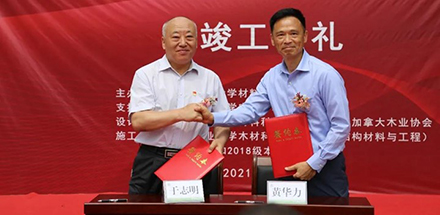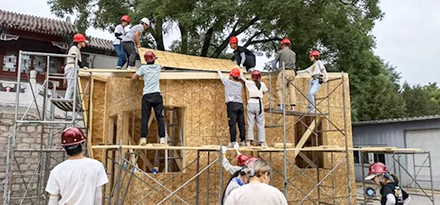
Yu Zhiming, Dean of the School of materials at Beijing Forestry University and Eric Wong, Managing Director of Canada Wood China
Canadian Wood China has signed a strategic cooperation agreement with the Beijing Forestry University School of Materials Science and Technology (BFU). The partnership aims at building a joint platform for training construction professionals, conducting industry research, cooperating in the advancement of codes and standards for wood building systems, and program development in wood structure design and construction engineering. Source: Timberbiz
Canada Wood Group is a non-profit organization promoting the use of Canadian wood products in the construction and wood-in-manufacturing sectors. Our programs, supported by government and industry funding, demonstrate the benefits of innovating with wood to build foundations for market growth in China, Japan South Korea, and Europe.
With the growing acceptance of Wood Frame Construction (WFC) in China, BFU is keen to expand its WFC education programs, and integrate WFC training into their regular undergraduate courses.
As a leading university in forestry industries and wood engineering, the history of BFU goes back to 1902, originally known as the Forestry Section of the Agriculture Department of the Imperial University of Peking.
In 1952, the Forestry Department of Beijing Agricultural University and that of Hebei Agricultural Institute were combined to set up an independent Beijing Forestry College (BFC), one of the earliest higher education institutes in the country that specialized in forest studies.
BFC was designated in 1960 as a key national university and one of the first “211 Project” key construction universities in China, with the name of BFC formally changed in 1985 to the present name of Beijing Forestry University.
In 2016, a new major for wood structural materials and engineering was added under the program for wood science and engineering, to comply with the national policy to develop green building materials and prefabricated building structures.
At the signing ceremony, Zou Guohui, Vice President of the Beijing Forestry University, talked about China’s targets to reach a carbon peak by 2030 and carbon neutrality by 2060.
The development of the green economy is an important part of the ef-forts to comply with the global trend of green and low-carbon development.
The sustainable use of wood has significant benefits for carbon reduction, so the wood construction industry shows great potential as it helps China to reach environmental targets.
In the training of construction industry professionals, the BFU College of Materials, Science and Technology attaches great importance to practical teaching.
In 2019, BFU and CW China started a joint program to integrate wood construction training with the professionals practice course of wood structure materials and engineering as a three-week comprehensive program.
Students integrate theory with practice through architecture and structural design, component processing and on-site construction.
The signing coincided with the completion of the demonstration project built as part of the program, and the leaders attending the signing ceremony jointly unveiled the project.
Professor Yu Zhiming, President of the BFU School of Materials Science and Technology, gave a speech about the combination of the light wood structure demonstration project with the practice course and training on architectural design, and the ways it benefited the promotion of modern wood structures. This program will cultivate world-class expertise in China with solid theory and engineering training to serve the wood construction industry, to design and build more large-scale wood structure buildings.
With the new MOU, this practical training course will be extended for the training of wood construction practitioners, to establish a training centre in northern China. This builds on the work CW China has done to establish training centres at the Changzhou Vocational School for eastern China and the Nanning Vocational School for Southern China. With technical expertise from CW China, these training centres are building momentum of their own to expand market capacity for wood construction in China by increasing the number of industry professionals that are specialized in modern wood building techniques.





